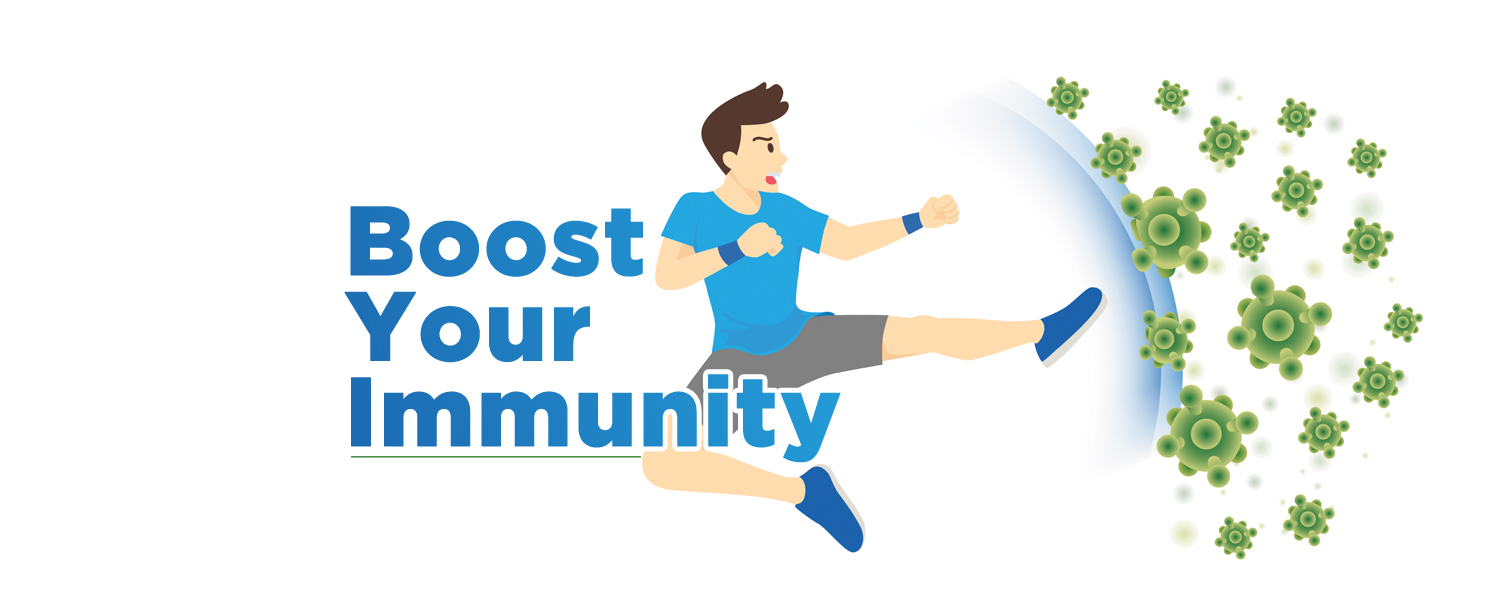Is everybody around you feeling sick or recovering from a respiratory infection? Depending on how powerful their immune system is, some people will experience moderate symptoms while others would be seriously affected. Your immune system is a large network of organs, white blood cells, proteins (antibodies), and chemicals. This system works together to protect you from foreign invaders (bacteria, viruses, fungi, parasites) that cause infection, illness, and disease. A normally functioning immune system keeps you healthy by fighting off harmful foreign intruders such as bacteria and viruses. However, a weak immune system makes it difficult for your body to fight external infections. A weak immunity makes you more vulnerable to infections, can produce unpleasant symptoms, and takes longer recovery periods too. Maintaining a healthy lifestyle and consuming healthy foods go a long way in increasing your immunity.
Nutrition and Immunity
Eating enough nutrients as part of a varied diet is required for the health and function of all cells, including immune cells. Choosing fresh, whole, unprocessed foods does wonders for your overall health. Several nutrient-rich foods, particularly those that include vitamin C, vitamin D, zinc, selenium, iron, and protein are important to help boost your immunity. Limit your intake of salt and sugar and avoid consumption of fried foods. Here are a few recommended foods to help strengthen your immune system:
- Vitamin C
Vitamin C is well-known for its immunity-boosting properties. It is best consumed in fresh form than in packaged juice. Include oranges, broccoli, kiwi or bell peppers in your diet. - Probiotics
Probiotics are healthy gut bacteria that protect your body against infection. Fermented foods such as idli and dosa, curd, buttermilk, and pickles are excellent sources of probiotics. - Antioxidants
Stress can reduce your immunity, making you more susceptible to sickness. Have a diet rich in antioxidants to protect yourself from oxidative stress and build a strong immune system. This includes colourful fruits and vegetables such as berries, carrots, pumpkin, spinach, etc. - Eat anti-inflammatory foods
A diet rich in anti-inflammatory foods helps balance hormones, improves your body’s ability to fight infection, and improves your digestive health. Dark leafy green vegetables, nuts, and seeds, ghee, avocado, olive oil are all good examples of anti-inflammatory foods. - Add protein to your diet
The amino acids in protein help the body manufacture antibodies and can help protect you against a wide range of infections. - Omega-3 fatty acids
These are essential fats that your body cannot make but must be procured from food. Foods high in omega-3 include fish, vegetable oils, walnuts, flax seeds, flaxseed oil, and leafy vegetables. They are essential to maintain strong immunity. - Ginger and garlic can help
Make ginger and garlic a part of your daily diet. Garlic’s antibacterial and anti-inflammatory qualities aid to improve the function of your immune cells. Ginger, on the other hand, reduces inflammation and strengthens the immune system due to its antibacterial characteristics.
Lifestyle Improvements
It is not just the diet you eat on a daily basis that makes you healthy and strong., but your lifestyle habits matter too. Adapting good and healthy habits consistently can significantly improve your immune function and make you stronger. Follow these simple health tips to increase immunity naturally:
- Find ways to manage stress
Are you busy handling various responsibilities and chasing deadlines? Being stressed all the time lowers your immunity. Take frequent breaks and find ways to cope better with stress. - Get adequate sleep
Lack of sleep releases higher levels of stress hormones in the body and this can cause more inflammation in the body. A regular sleep cycle serves as the ideal time for the body to regenerate cells, repair any broken cells and organs, and thus boost your immune function. - Say No to smoking and drinking alcohol
Excessive cigarette use and alcohol intake weakens the immune system and makes people more susceptible to lung infections. Furthermore, other substances generated during cigarette smoking, such as carbon monoxide and nicotine, have been shown to inhibit the formation of immunity-boosting cells. - Exercise regularly
Exercise increases your resilience so you can fight off infection. Your body can function better when you are physically active every day. - Get enough sunlight
Vitamin D is important for your immune system, and regular sun exposure can assist to enhance it. Take some morning sunlight every day to help strenhtne your immunity. - Meditation
Even five minutes of guided meditation every day, or simply sitting quietly and concentrating on your breath, can help. Meditation helps relieve your anxiety and thus strengthens your immunity. - Preventive health checkup
Regular health checkups help detect diseases early and start treatment early. This helps correct any irregularities with timely medical intervention and thus helps maintain your immunity.
Follow these healthy lifestyle tips to build a strong defence against any external pathogens, virus or bacteria. Stay healthy, stay safe.


